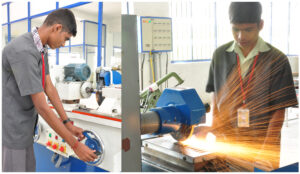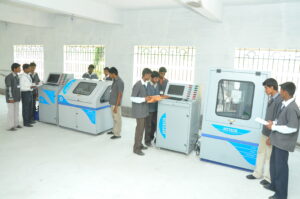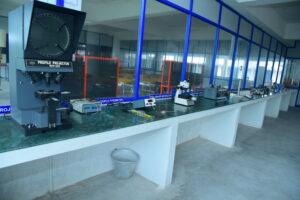
About Us
Mechanical Engineering is the evergreen branch among all other branches of engineering has been established in the year of 2009. It has one UG (BE-Mechanical Engineering) & one PG (ME-Manufacturing Engineering) programme. Mechanical engineering is one of the broadest engineering disciplines. Mechanical engineers design, develop, build, and test. They deal with anything that moves, from components to machines to the human body. Mechanical Engineering is nonetheless in the field of Engineering. This field especially specialized in the principles of Engineering, Physics, Mathematics and material science to design, manufacture, test and maintain mechanical systems. Mechanical engineering plays a critical role in manufactured technologies, from cars to airplanes and refrigerators. It makes the people to do many daily activities with ease, as it brings helpful technologies to our modern society. The broadness of the Mechanical Engineering degree offers a wide array of career possibilities. The key characteristics of the profession are its breadth, flexibility, and individuality.
The career paths of mechanical engineers are largely determined by individual choices, a unique advantage in a dynamic world. Mechanical engineers are no longer confined to the traditional industries of aerospace, automotive, and manufacturing, but are also employed extensively in important emerging areas, such as nuclear technology, robotics, biomedical technology and energy systems. Furthermore, our students acquire valuable skills in creative thinking, critical analysis and teamwork, which are highly sought after in any engineering industry, consulting and management. It has plenty number of opportunities to advance your skills using Computer aided design/engineering/manufacturing systems, or in the laboratory. It is one of the most important subdivisions of engineering, because without it, many of the technologies we use every day would not be available. Learning the fundamentals of mechanical engineering, helps to get exposed to the fast developing and benevolent technology such as Automation & Robotics, Smart Aviation, and Industry 4.0 etc.., Mechanical Engineering creates a base for students who desire to lead their career in the fields of Design, Materials, Manufacturing, CAD/CAM/CAE, Automation, Mechatronics, FEM as well as managerial administrative of industry.
Intake :60
VISION & MISSION
VISION
Produce competent Mechanical Engineering professionals with scientific temper, values, ethics, team spirit and capabilities to face new challenges.
MISSION
- Provide conducing learning environment with state-of-the-art infrastructure facilities, laboratories and teaching learning systems.
- Produce skilled Mechanical Engineers with skills towards employability, leadership, communication skills with social responsibilities and ethical values.
- Inculcate Professional skills to function as proficient engineers and designers capable of building sustainable equipment and infrastructure for the society.
- Promote research and development activities in the rapidly changing technologies related to Mechanical Engineering and allied areas.
R-2017 PROGRAMME EDUCATIONAL OBJECTIVES (PEOs)
PEO1.Successful Career: Have a successful career in Mechanical Engineering and allied industries.
PEO2.Expertise: Have expertise in the areas of Design, Thermal, Materials and Manufacturing.
PEO3.Technological Development: Contribute towards technological development through academic research and industrial practices.
PE04.Profession: Practice their profession with good communication, leadership, ethics and social responsibility.
PE05.Life-long Learning: Graduates will adapt to evolving technologies through life-long learning.
R-2021 PROGRAMME EDUCATIONAL OBJECTIVES (PEOs)
Bachelor of Mechanical Engineering curriculum is designed to impart Knowledge, Skill and Attitude on the graduates to:
PEO1.Successful Career: Effectuating success in careers by exploring with the design, digital and computational analysis of engineering systems, experimentation and testing, smart manufacturing, technical services, and research.
PEO2.Competencies and Abilities: Amalgamating effectively with stakeholders to update and improve their core competencies and abilities to ethically compete in the ever-changing multicultural global enterprise
PEO3.Innovation and Entrepreneurship: To encourage multi-disciplinary research and development to foster advanced technology, and to nurture innovation and entrepreneurship in order to compete successfully in the global economy.
PE04.Apply Technical Knowledge: To globally share and apply technical knowledge to create new opportunities that proactively advances our society through team efforts and to solve various challenging technical, environmental and societal problems.
PE05.Great Leaders: To create world class mechanical engineers capable of practice engineering ethically with a solid vision to become great leaders in academia, industries and society.
R-2023 PROGRAMME EDUCATIONAL OBJECTIVES (PEOs)
PEO1.Successful Career:Effectuating success in careers by exploring with the design, digital and computational analysis of engineering systems, experimentation and testing, smart manufacturing, technical services, and research.
PEO2.Core Competency:Amalgamating effectively with stakeholders to update and improve their core competencies and abilities to ethically compete in the ever-changing multicultural global enterprise.
PEO3.Technological Development:To develop the advanced technology and to nurture innovation and entrepreneurship in order to compete successfully in the global economy.
PE04.Technical Knowledge:To globally share and apply technical knowledge to create new opportunities that proactively advances our society through team efforts and to solve various challenging technical, environmental and societal problems.
PE05.Proficiency:To create world class mechanical engineers capable of practice engineering ethically with a solid vision to become great leaders in academia, industries and society.
PROGRAMME OUTCOMES(POs)
- Engineering knowledge: Apply the knowledge of mathematics, science, engineering fundamentals, and an engineering specialization to the solution of complex engineering problems.
- Problem analysis: Identify, formulate, review research literature, and analyze complex engineering problems reaching substantiated conclusions using first principles of mathematics, natural sciences, and engineering sciences.
- Design/development of solutions: Design solutions for complex engineering problems and design system components or processes that meet the specified needs with appropriate consideration for the public health and safety, and the cultural, societal, and environmental considerations.
- Conduct investigations of complex problems: Use research-based knowledge and research methods including design of experiments, analysis and interpretation of data, and synthesis of the information to provide valid conclusions.
- Modern tool usage: Create, select, and apply appropriate techniques, resources, and modern engineering and IT tools including prediction and modeling to complex engineering activities with an understanding of the limitations.
- The engineer and society: Apply reasoning informed by the contextual knowledge to assess societal, health, safety, legal and cultural issues and the consequent responsibilities relevant to the professional engineering practice.
- Environment and sustainability: Understand the impact of the professional engineering solutions in societal and environmental contexts, and demonstrate the knowledge of, and need for sustainable development.
- Ethics: Apply ethical principles and commit to professional ethics and responsibilities and norms of the engineering practice.
- Individual and team work: Function effectively as an individual, and as a member or leader in diverse teams, and in multidisciplinary settings.
- Communication: Communicate effectively on complex engineering activities with the engineering community and with society at large, such as, being able to comprehend and write effective reports and design documentation, make effective presentations, and give and receive clear instructions.
- Project management and finance: Demonstrate knowledge and understanding of the engineering and management principles and apply these to one’s own work, as a member and leader in a team, to manage projects and in multidisciplinary environments.
- Life-long learning: Recognize the need for, and have the preparation and ability to engage in independent and life-long learning in the broadest context of technological change
R-2017 PROGRAMME SPECIFIC OUTCOMES(PSOs)
- Development: Apply the knowledge of Production and Manufacturing Engineering to the development of mechanical problems.
- Ability: Demonstrate the ability to make a product related to mechanical engineering and allied engineering fields.
R-2021 PROGRAMME SPECIFIC OUTCOMES(PSOs)
On successful completion of the Mechanical Engineering Degree programme, the Graduates shall exhibit the following
- Design and Development : Apply the knowledge gained in Mechanical Engineering for design and development and manufacture of engineering systems
- Investigate Research: Apply the knowledge acquired to investigate research-oriented problems in mechanical engineering with due consideration for environmental and social impacts.
- Multidisciplinary: Use the engineering analysis and data management tools for effective management of multidisciplinary projects.
R-2023 PROGRAMME SPECIFIC OUTCOMES(PSOs)
PSO1: Design and Development: Apply the knowledge gained in Mechanical Engineering for design and development and manufacture of engineering systems.
PSO2: Investigate: Apply the knowledge acquired to investigate the problems in Mechanical Engineering with due consideration for environmental and social impacts.
PSO3: Engineering Analysis: Use the engineering analysis and data management tools for effective management of multidisciplinary projects.
Course Outcomes
Faculty Details
|
S. |
NAME |
QUALIFICATION |
DESIGNATION |
|
1 |
Dr.S.PRAKASAM |
ME, PhD |
PROFESSOR |
|
2 |
Dr.E.MOHANKUMAR |
ME, PhD |
PROFESSOR |
|
3 |
Dr.K.M.ARUNRAJA |
ME, PhD |
ASSOCIATE PROFESSOR |
|
4 |
Dr.S.SELVAKUMAR |
ME, PhD |
ASSOCIATE PROFESSOR |
|
5 |
K.KANNAKUMAR |
BE, ME (PhD) |
ASSISTANT PROFESSOR |
|
6 |
S.MEINATHAN |
BE, ME |
ASSISTANT PROFESSOR |
|
7 |
P.LINGESWARAN |
BE, ME |
ASSISTANT PROFESSOR |
|
8 |
K.MAHARAJA |
BE, ME |
ASSISTANT PROFESSOR |
|
9 |
M.A.RAMESH |
BE, ME |
ASSISTANT PROFESSOR |
|
10 |
C.VICKNESH |
BE, ME |
ASSISTANT PROFESSOR |
|
11 |
M.KANAGARAJAN |
BE, ME |
ASSISTANT PROFESSOR |
|
12 |
L.DINESHKUMAR |
BE, ME |
ASSISTANT PROFESSOR |
|
13 |
S.SATHISHKUMAR |
BE, ME |
ASSISTANT PROFESSOR |
|
14 |
P.SAKTHIVEL |
BE, ME |
ASSISTANT PROFESSOR |
|
15 |
K.BHUVANESWARAN |
BE, ME |
ASSISTANT PROFESSOR |
|
16 |
A.TAMILSELVAN |
BE, ME |
ASSISTANT PROFESSOR |
|
17 |
K.RAVI SHANKAR |
BE, ME |
ASSISTANT PROFESSOR |
|
18 |
S.NIRMALKUMAR |
BE, ME |
ASSISTANT PROFESSOR |
|
19 |
V.PRABAKARAN |
BE, ME |
ASSISTANT PROFESSOR |
|
20 |
D.MOHANRAJ |
BE, ME |
ASSISTANT PROFESSOR |
|
21 |
V.VELLIYANGIRI |
BE, ME |
ASSISTANT PROFESSOR |
|
GENERAL ENGINEERING |
|||
|
S. |
NAME |
QUALIFICATION |
DESIGNATION |
|
1 |
G.C.RAJESH |
BE, ME |
ASSISTANT PROFESSOR |
|
2 |
V.D.PRABHU |
BE, ME |
ASSISTANT PROFESSOR |
|
3 |
G.BALAKRISHNAN |
BE, ME |
ASSISTANT PROFESSOR |
|
M.E-INDUSTRIAL SAFETY ENGINERING |
|||
|
S. |
NAME |
QUALIFICATION |
DESIGNATION |
|
1 |
Dr.P.THANGAVEL |
ME, PhD |
PROFESSOR |
|
2 |
P.ELANGOVAN |
BE, ME |
ASSISTANT PROFESSOR |
Laboratory
LATHE SHOP LABORATORY
The Lathe Shop, a key facility within the Department of Mechanical Engineering, serves as an essential space for both academic learning and hands-on training. Equipped with modern lathe machines and tools, the shop provides students with opportunities to gain practical experience in machining processes. The primary objectives of the Lathe Shop include:
- Teaching fundamental and advanced machining techniques, such as turning, threading, facing, and knurling.
- Offering students a hands-on environment to apply theoretical concepts in metal cutting, shaping, and finishing.
- Promoting precision engineering and craftsmanship through the use of state-of-the-art equipment.
- Preparing students for industry practices by familiarizing them with various lathe operations and safety procedures.
- Supporting student projects, research, and innovation in manufacturing processes.
The Lathe Shop ensures that students develop the technical skills necessary for machining, while also fostering a strong understanding of real-world engineering applications.


MECHATRONICS LABORATORY


The Mechatronics Laboratory, part of the Department of Mechanical Engineering, plays a vital role in both academic learning and research. Equipped with cutting-edge facilities and experimental setups, it offers students the opportunity to explore and engage with the field of mechatronics. The lab has several key objectives, including:
- Promoting interdisciplinary research and industry-driven innovation in advanced areas of mechatronics.
- Integrating mechanical, electronics, control engineering, and computer technologies to create synergies.
- Providing a focused environment where engineering students can apply and internalize mechatronics concepts.
- Offering a space for students to perform experimental studies on sequence control using various sensors and actuators.
- Helping students develop “hands-on” skills, emphasizing hardware architecture and multidisciplinary systems.
This laboratory is designed to prepare students for real-world applications and innovations in mechatronics.
SPECIAL MACHINES LABORATORY
The Special Machines Lab, within the Department of Mechanical Engineering, is an essential facility focused on training students in traditional machining methods. Equipped with a variety of machines, this lab provides a strong foundation in manual machining and operational techniques. The key objectives of the Special Machines Lab are:
- Offering students hands-on experience with traditional machines like lathes, milling machines, shapers, and grinders.
- Teaching fundamental machining processes such as turning, drilling, shaping, and milling, which are vital for manufacturing.
- Providing a practical understanding of material properties, machine operation, and cutting tool techniques.
- Supporting student projects and research, allowing them to apply machining concepts to real-world tasks.
- Ensuring students are well-versed in standard safety protocols and operational procedures for machine tools.
This lab plays a critical role in developing students’ foundational skills in machining, preparing them for careers in industries that rely on manufacturing techniques.


ENGINES LABORATORY


The Engines Lab is an essential component of mechanical or automotive engineering programs, designed to provide students with practical skills and hands-on experience with different engine types. The lab primarily focuses on internal combustion engines (ICE), including both gasoline and diesel engines. It aims to bridge theoretical knowledge with practical applications, helping students understand engine operation, performance, and environmental impact.
WORK SHOP LABORATORY
In today’s rapidly evolving industrial landscape, workshop practices have become an integral part of the production process, playing a crucial role in the creation of products that serve the needs of mankind. A deep understanding of manufacturing practices is essential for all engineers and technocrats, as it lays the foundation for mastering modern manufacturing technologies. Workshop practices provide the fundamental working knowledge necessary for the production of various engineering products. Through hands-on experience, these practices equip individuals with the skills to understand the construction, function, and application of diverse tools, equipment, and machines. By mastering these essential practices, they become well-prepared to meet the demands of modern industries and drive progress in engineering and technology.


Boiler Lab


The Boiler Lab is a vital component of thermal engineering education, offering students practical experience and detailed knowledge about boiler systems used in various industrial and power generation applications. The lab focuses on the design, operation, and analysis of boilers, which are essential for generating steam and heat in numerous settings.
CAD / CAM LABORATORY
The CAD/CAM Lab in our engineering college is a state-of-the-art facility dedicated to computer-aided design (CAD) and computer-aided manufacturing (CAM) applications. The lab provides students with hands-on experience in designing and simulating products using advanced CAD software, as well as understanding the manufacturing processes through CAM tools. Equipped with modern workstations and cutting-edge software, the lab helps students enhance their technical skills in areas like 3D modeling, product design, CNC programming, and automation. This lab plays a crucial role in bridging the gap between theoretical knowledge and practical industrial applications.


HEAT AND MASS TRANSFER LABORATORY


The Heat and Mass transfer lab course is mainly provided for third-year B.E. Mechanical Engineering students to help them to understand the principles of conduction, convection, radiation, boiling, and condensation modes of heat transfer, as well as the fundamentals of refrigeration and air conditioning. The lab focuses on the practical application of theoretical concepts related to heat and mass transfer in various systems, aiding students in connecting their academic knowledge with practical engineering challenges.
METROLOGY LABORATORY
The Metrology Laboratory is a dedicated facility that focuses on precision measurement and quality control techniques. Equipped with a range of advanced instruments, including Vernier calipers, micrometers, height gauges, bore gauges, and surface metrology tools, the lab offers students hands-on experience in accurate calibration and measurement processes. The lab enables the study of various industrial applications such as screw thread measurement, gear parameter analysis, and surface form assessments like flatness, roundness, and Cylindricity.
By providing practical training in fundamental measurement techniques, the Metrology Lab helps students develop the essential skills needed for careers in manufacturing, engineering, and product quality assurance.


DYNAMICS LABORATORY


The Dynamics Laboratory aims to equip students with the knowledge and skills necessary to design and analyze mechanisms involved in machine elements. It is a state-of-the-art facility dedicated to conducting a wide range of experiments in the field of mechanics. The laboratory focuses on providing both theoretical knowledge and practical experience, preparing students to tackle real-world industrial challenges. Supporting undergraduate courses, research scholars, and student projects, it also fosters advanced experimental research. Additionally, the lab serves as a platform for design projects, integrating concepts of dynamics, vibrations, and controls. By engaging with this lab, students are better prepared to meet current industry standards in structural dynamics and product design.
Indian Institution of Production Engineers(IIPE)
Indian Institution of Production Engineers (IIPE) is an Indian professional society devoted to the advancement of science, technology, contributing to the manufacturing and technology excellence of this country. To establish collection of models, designs, drawings, books, articles in connection with the development and improvement of Mechanical Engineering discipline.
REPORT


